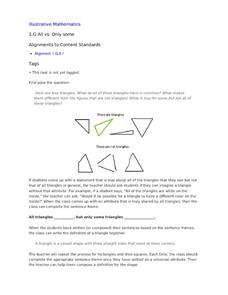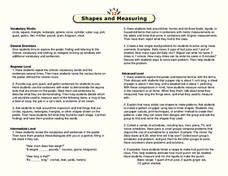K12 Reader
The Ransom of Red Chief
Readers identify the irony in the ransom note to Ebenezer Dorset and his reply as part of a reading comprehension activity using O. Henry's "The Ransom of Red Chief."
Math Solutions
Shape Sorting: Looking for Green!
Young mathematicians rotate, flip, and sort their way to an understanding of the different attributes of geometric figures. Using transparent yellow and blue shapes, children try to match congruent figures together to create...
One Billion
Math, Age 3-5
Jump start children's math education with this fun basic skills resource. Offering dozens of different touch-and-swipe activities with colorful graphics, this program is perfect for all young learners.
Kuta Software
Classifying Angles
Learners sharpen their classification of angles skill with a simple angles worksheet that starts with unlabeled angles and ends with specific angle measures to classify.
Super Teacher Worksheets
Solid Figures
In the hustle and bustle of everyday life it's easy to forget that geometric shapes are everywhere in the world around us. As they complete this shape identification worksheet, young mathematicians realize that many common real-life...
Curriculum Corner
“I Can” Common Core! 1st Grade Math
Any first grader can master the Common Core math standards with this checklist! With each standard rewritten as an affirmative I can statement, children are provide with clear goals to work toward throughout the school year.
Display an...
Illustrative Mathematics
3-D Shape Sort
From the apple on your desk and the coffee cup in your hand, to the cabinets along the classroom wall, basic three-dimensional shapes are found everywhere in the world around us. Introduce young mathematicians to the these common figures...
Illustrative Mathematics
All vs. Only Some
All shapes have certain defining attributes that set them apart from others. In order to understand this, young mathematicians look at examples and non-examples of triangles, rectangles, and squares, working as a whole class to create...
Curated OER
Similar Shapes
In geometry, similar and congruent shapes are often confused. Shapes that are similar are the same shape, but a different size. This activity gives young learners some practice in identifying similar shapes. There are five polygons...
Utah Education Network (UEN)
Geo Shapes
Invite your first graders to compose and decompose two and three-dimensional figures with this fun, hands-on lesson. They investigate and predict the results of putting together and taking apart two-dimensional shapes with rubber bands...
Curated OER
Same Shape and Size
Can your kindergartners recognize shapes? What about when they are in different orientations? Youngsters study groups of shapes to determine which have the same shape and size. Two of the groups have triangles and ovals, and the other...
Curated OER
2-Dimensional Shapes: Looking at Shapes
Help scholars identify shapes more thoroughly by counting their attributes. They examine eight 2-dimensional shapes, recording the number of sides and corners for each writing the name. Consider creating a class poster together before or...
Curated OER
Congruent Shapes
Which of these shapes is congruent? Young geometers examine five familiar shapes: triangle, oval, rectangle, triangle, and circle. Each is followed by a set of shapes, of which one is congruent. They circle the congruent shape. Consider...
Curated OER
2-Dimensional Shapes: Adding Up Shapes
These pictures will cost you! Each shape is worth a money amount. Scholars use this value system to price four images composed of these shapes. There is an example to help them get started which demonstrates labeling each shape before...
Math Worksheets Land
Attributes of Shapes Guided Lesson
Teach your scholars about shape attributes using this brief worksheet, which could be used as an all-class warm-up. There are three sets of shapes for learners to assess here. First, they count the number of triangles, then shade the...
Growing Minds
Apple Exploration
Turn your classroom into a farmers' market! Reading Applesauce Season by Eden Ross Lipson or Monica Wellington’s Apple Farmer Annie, launches this investigation of apples, farmers' markets, and the people selling products. The class...
Houghton Mifflin Harcourt
Shapes and Measuring
Youngsters develop mathematical vocabulary with this worksheet. First, give youngsters time to identify their vocabulary words in the picture provided. Then, as a group, practice saying the vocabulary words aloud. Finally, have learners...
Arizona State University
Tricorn Triangles
Help your learners examine triangles. Pupils explore the different sizes and measurements of triangles. They discover triangles can be isosceles or scalene, and examine the attributes of triangles. Here is the website where you can find...
Alabama Learning Exchange
Twisted Tangrams
Primary geometers create a picture using tangrams. In this geometry lesson, students read Grandfather Tang: A Tale Told with Tangrams, cut out their own tangrams, and choose a character from the story to make using their tangram pieces.
Alabama Learning Exchange
Origami Geometry
Origami is an excellent way to combine Japanese culture, art, and geometric shapes into one engaging instructional activity! Scholars begin by listening to the story Sadako and the Thousand Paper Cranes and learn the origin of the...
Math Mammoth
Practice Equivalent Fractions
Fourth and fifth graders look at the pictures of nine circle fraction pieces and draw lines between the ones that show the same amount. They label each fraction circle. They split fraction pieces in the next 9 examples, and draw the new...
Curated OER
Attribute Cards
Print these shapes on cardstock, laminate them, cut them out, and use them to teach kindergarten and first graders about the attributes of shapes.
Curated OER
Beef or Dairy?
Guernsey, Jersey, Holstein. Brangus, Charoloais, Herford. Here’s a truly cross-curricular resource that combines language arts, science, math, and visual arts activities as class members learn to distinguish between beef and dairy...
Curated OER
A Field of Beans
Beans, or legumes as they are sometimes called, are the topic for an integrated multi-subject lesson. Youngsters will read, write, observe, and research everything there is to know about beans. They read a bean story, conduct a bean...
























